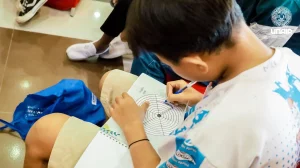The coronavirus disease 2019 (COVID-19) pandemic represents a once in a century challenge to human health care with over 4.5 million cases and over 300,000 deaths thus far.
Many countries reported decreases in hospital and outpatient care since the COVID-19 pandemic. This declining condition is especially reported in referral center hospitals in many countries. Management of operating practices has been significantly affected during this crisis. One of the affected is a health care procedure in the department of Neurosurgery which has the field of neurotrauma, neurovascular, neuro-oncology, neuropediatric, neurofunctional, and neuro spine.
Contributed to this field, a Comparative Study conducted by Faris et al. (2021) from Universitas Airlangga – Rsud Dr. Soetomo Surabaya, the study, which has been published in Surgical Neurology International (Scientific Scholar), aims to report data on the COVID-19 pandemic on neurosurgery treatment, especially in spinal cord surgery in tertiary referral hospitals and COVID-19 referral center hospitals.
The study used retrospective control case studies with observational analytics. The sampling method uses the total population of the neurospine division of the neurosurgery department that came to the polyclinic, emergency department, and hospitalizations in January to December 2019 (before the COVID-19 pandemic) and from January to December 2020 (during the COVID-19 pandemic). Group comparisons were analyzed using the nonparametric Kruskal-Wallis comparative test. Statistical analysis using IBM SPSS Statistics for Mac version 26. Differences in group outpatient visits, emergency department visits, and surgical procedures are statistically calculated and considered significant if P
Data was collected from Dr. Soetomo General Academic Hospita, a tertiary referral hospital in Surabaya, East Java, Indonesia. Data were analyzed from clinics, emergency departments, and neurospine case surgeries. This study showed a decrease in the number of outpatient visits of neurospine patients during the COVID-19 pandemic in 2020 compared to the period before the pandemic in 2019. There was a decrease in numbers, but statistically, there was no significant difference (P > 0.05). In June 2020, the number of neurospine outpatient visits was higher than before the pandemic. In the first three months, January – March 2020, the number of patients was still the same as before the pandemic. The decrease in neurospine patient visits decreased in the rest of the month, and the lowest number of visits occurred in July 2020, when the number of COVID-19 cases in Indonesia was above the peak. All resources are used to treat COVID-19 patients, and there is a restriction policy in outpatient visits.
Based on statistical data, the number of the spinal cord and emergency department surgical procedures decreased significantly (P
Some of the problems of COVID-19 are human resources and the use of ICU space. The use of ICU space is reduced because it is used for COVID-19 patients and medical personnel help treat COVID-19 patients. Some elective surgeries are canceled, and only emergency or urgent surgery is performed.
The number of emergency department patients decreased significantly during the pandemic, although neurospine emergency department visits were low before the pandemic. During the pandemic, there was only one patient in January 2020 and no patients in the rest of the month. This decrease in number can be due to mobility restriction policies, and almost all cases in IGD are COVID-19 cases.
As one of the tertiary referral hospitals, almost all cases are referred to Surabaya, including COVID-19. When the hospital cannot accept other cases, all cases from other hospitals, especially neurospine, are postponed for a referral.
Ultimately, the study revealed that the number of neurospine patients in clinics, emergency departments, and surgical procedures decreased during pandemics compared to before the pandemic in the same period. The COVID-19 pandemic changed all scopes of medical practice and training. Given the limited resources available, the number of cases may decrease in subspecialty disciplines such as spinal cord surgery. The COVID-19 pandemic impacted spinal cord treatment policies and neurosurgery in tertiary referral hospitals.
Author: Muhammad Faris, dr., Sp.BS.
Journal paper link: https://pubmed.ncbi.nlm.nih.gov/34992936/









